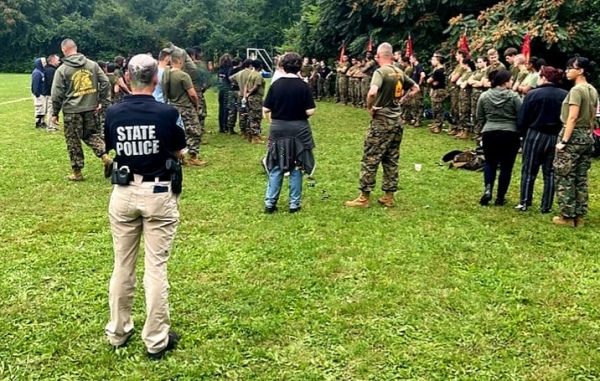Commission will advise on policies and strategies to reduce emissions from heating fuels.
Building on the Baker-Polito Administration’s national leadership on climate change and its commitment to achieving Net Zero Greenhouse Gas Emissions by 2050, Governor Charlie Baker today signed an Executive Order which establishes a Commission on Clean Heat to advise the Administration on strategies and policies to achieve deep emissions reductions from the use of heating fuels in the Commonwealth.
The Commission, the first-of-its-kind in the United States, will establish a framework for a long-term decline in emissions from heating fuels, consistent with the findings from the Administration’s 2050 Decarbonization Roadmap, and help the Commonwealth meet the ambitious emissions reduction targets signed into law by Governor Baker in March 2021. The Executive Order was signed as the Administration celebrates Climate Week in Massachusetts.
“Recognizing the urgent challenge presented by climate change and the need to reduce emissions, our Administration is convening this first-of-its-kind commission to help the Commonwealth meet our emissions reduction goals,” said Governor Charlie Baker. “By soliciting the expertise of leaders with a variety of perspectives, including the affordable housing community, we can ensure that the strategies and policies we pursue to reduce emissions from heating fuels will be innovative, affordable, and equitable.”
“Massachusetts has ambitious climate goals, and we will need to pursue innovative solutions to reduce emissions from our heating fuels, keep costs low, and deliver lasting benefits to our communities,” said Lieutenant Governor Karyn Polito. “The Commission on Clean Heat will reflect a diversity of expertise that will be crucial in developing the forward-thinking policies we need to achieve our nation-leading emissions reduction targets.”
The Commission will be chaired by Energy and Environmental Affairs Secretary Kathleen Theoharides, or a designee appointed by the Secretary, and shall include up to 22 additional members recommended by the Secretary and appointed by the Governor. The Commission will reflect a diversity of perspectives and backgrounds from outside stakeholders, including representatives from the fields of affordable housing, energy efficient building design and construction, healthcare, heating system design and technology, real estate, and heating fuel distribution.
Once appointed, the Commission will meet regularly, advise the Governor on a framework for long-term greenhouse gas emission reductions from heating fuels, and provide policy recommendations to help the Commonwealth meet the requirements of the Global Warming Solutions Act. In March 2021, Governor Baker signed nation-leading climate legislation that commits the Commonwealth to reducing emissions below 1990 levels by 50% by 2030, 75% by 2040, and to achieve Net Zero emissions by 2050.
“By working directly with stakeholders and soliciting a variety of perspectives, Massachusetts will be in a stronger position to develop innovative policies and solutions to cost-effectively reduce emissions from heating homes and buildings,” said Energy and Environmental Affairs Secretary Kathleen Theoharides. “The Executive Order signed by Governor Baker today once again puts Massachusetts on the leading edge of climate action in the U.S. by taking a deliberate, collaborative and thoughtful approach to decarbonizing our buildings sector.”
“Transitioning our buildings sector to a clean, resilient, and affordable future will require an unprecedented level of ambition, planning, and ultimately energy efficiency and clean energy deployment. Massachusetts has led the nation in bold and innovative energy policy and today’s Executive Order signed by Governor Baker embarks our state in another chapter of our climate leadership with a singular focus on clean building policies,” said Department of Energy Resources Commissioner Patrick Woodcock. “In order to achieve our long-term climate goals, we will need to make significant investments to lower emissions from our buildings sector through energy efficiency and clean energy and this new Commission starts the process with collaboration, deliberation, and analysis that will set that foundation.”
Aligned with the Administration’s 2050 Roadmap report, the Commission will develop policy recommendations to accelerate the deployment of energy efficiency programs and clean heating systems in new and existing buildings and transition existing distribution systems to clean energy. The Commission’s focus will include financing mechanisms, incentives, and other regulatory options including a framework for a cap on greenhouse gas emissions from heating fuels. As it develops its suite of recommendations, the Commission will also consider the various benefits of any policy proposal as well as affordability, equity, costs, and how it works within specific regional circumstances.
“As we continue to tackle the dual challenges of economic recovery and the housing crisis, I am pleased that we will have a Commission comprised of leaders with varied perspectives to deliberate on this important topic,” said Housing and Economic Development Secretary Mike Kennealy. “We look forward to the conversations and strategies that will come out of this collaborative effort.”
The Commission will provide Governor Baker with a set of policy recommendations by November 30, 2022 that will sustainably reduce the use of heating fuels and minimize emissions from the building sector while ensuring costs and opportunities arising from such reductions are distributed equitably.
The Executive Order also establishes an Interagency Building Decarbonization Task Force to support the work of the Commission. The Task Force will consist of subject-matter experts from across the Executive Branch, including the Department of Energy Resources and the Executive Office of Housing and Economic Development.
The Executive Order advances the Baker-Polito Administration’s commitment to take aggressive action on climate change and achieve Net Zero emissions in 2050. On December 30, 2020, the Administration released two reports – the Massachusetts 2050 Decarbonization Roadmap Report and an interim 2030 Clean Energy and Climate Plan (CECP) – that detail policies and strategies to equitably and cost-effectively reduce emissions and combat climate change. The Commission on Clean Heat was identified by the Administration as a critical tool in the effort to reduce emissions from heating fuels. The heating of buildings currently accounts for nearly one third of statewide greenhouse gas emissions in Massachusetts.
During this year’s Climate Week in Massachusetts, the Baker-Polito Administration is highlighting its commitment to reducing emissions, mitigating the impacts of climate change, and building a more resilient Commonwealth. Throughout Climate Week, the Administration is holding events to spotlight important initiatives including offshore wind, land protection and conservation, the Greening the Gateway Cities program, and the expansion of clean energy in the Commonwealth.
The Administration is also highlighting the urgent demand for funding to support climate resiliency in Massachusetts, and Governor Baker’s plan to immediately put to use part of Commonwealth’s direct federal aid from the American Rescue Plan Act (ARPA) to support critical priorities in cities and towns. The Administration’s plan would commit $900 million to key energy and environmental initiatives, including $400 million to modernize critical water infrastructure and $300 million to support local climate resilience projects.











